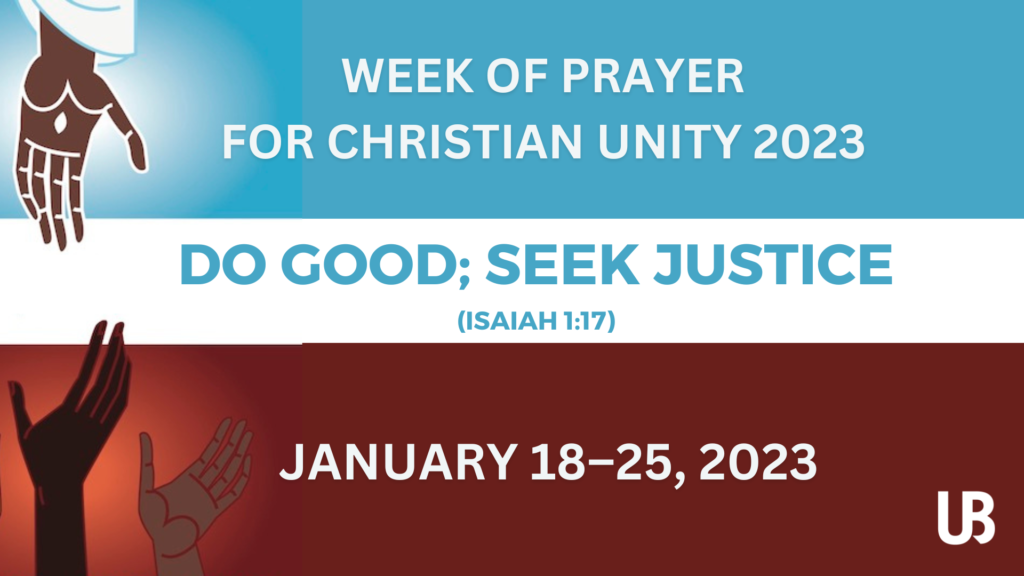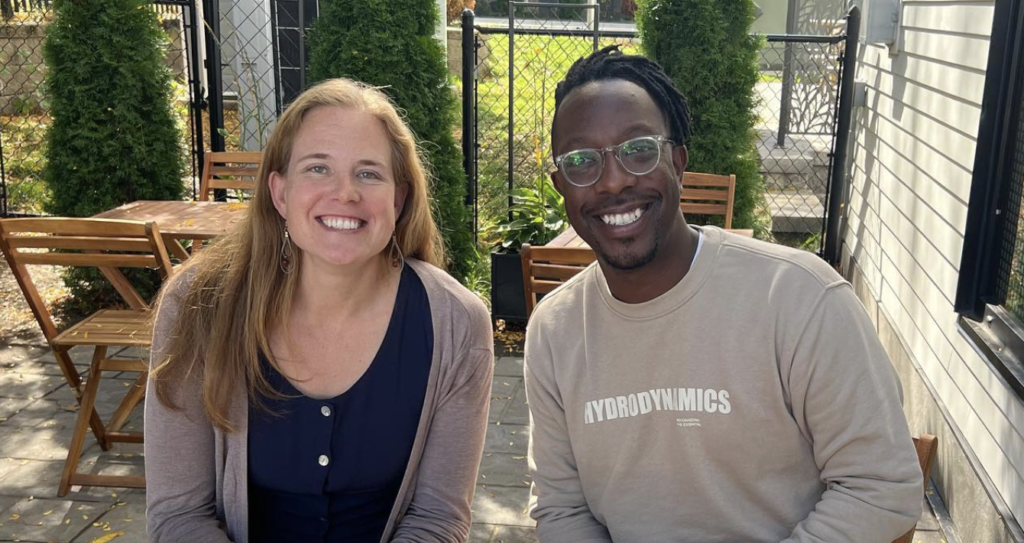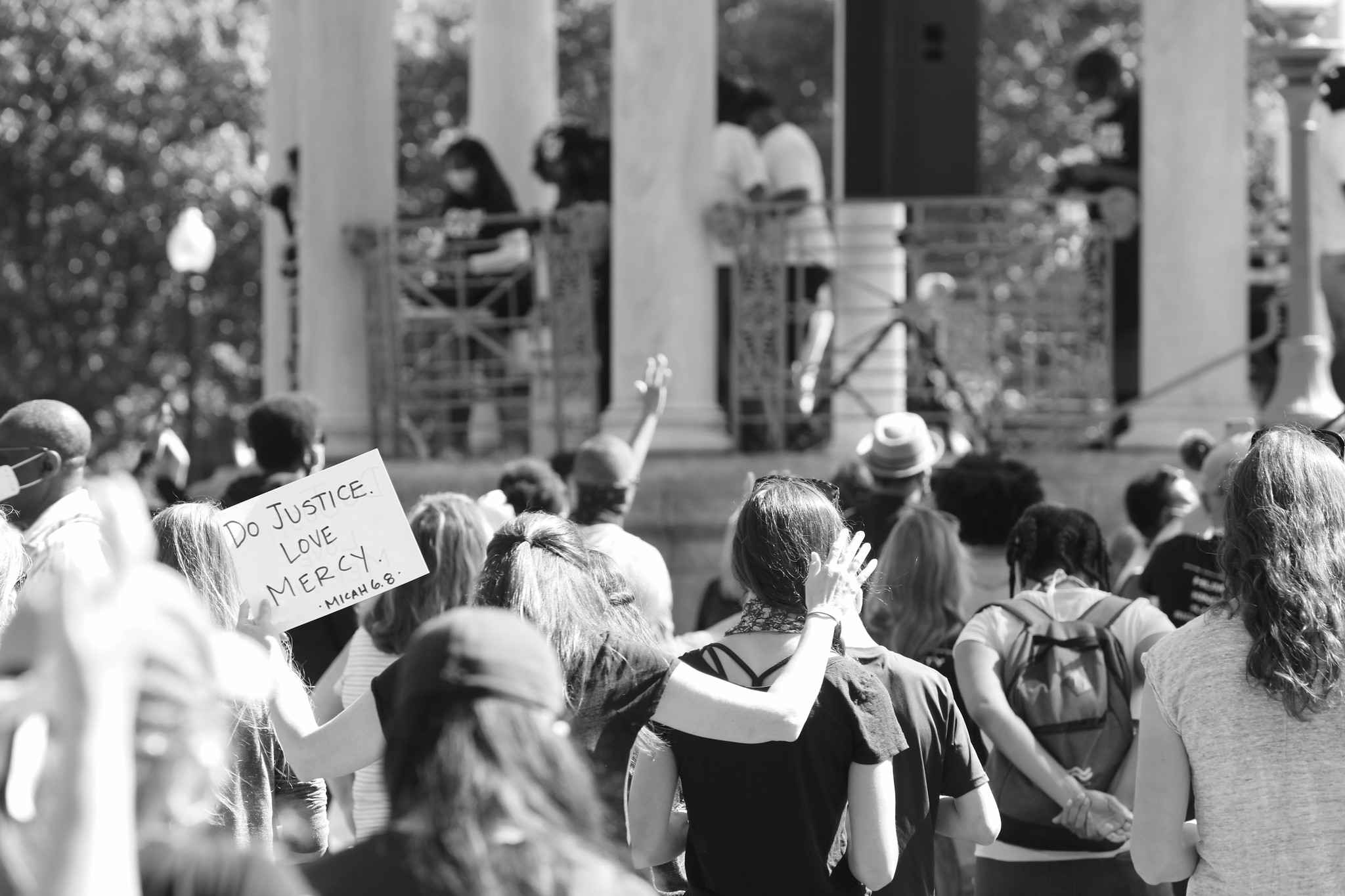
This year’s theme for the Week of Prayer for Christian Unity is “Do Good; Seek Justice” (Isaiah 1:17); chosen by the Minnesota Council of Churches. This year’s theme integrates a holistic understanding of justice, including how we can live our unity as Christians so as to confront the evils and injustices of our time, and in particular addressing the sin of racism.
The 2023 theme was developed with the assistance of a group of Christians in Minnesota, USA, convened by the Minnesota Council of Churches. Minneapolis, MN became a flashpoint for calls for racial justice and equity during the responses of communities to the George Floyd murder. This received world-wide attention and spurred on an awakening for the unjust reality that communities of color have faced for centuries and the change that is so imperative today. 
Read below to hear about how UniteBoston’s staff members Rev. Devlin and Rev. Kelly have been wrestling with the relationship between unity and justice and implications for UniteBoston’s work in the city.

Rev. Devlin Scott’s Reflection:
Like the world we inhabit today, the worlds of both the Old Testament and New Testament were ethnically diverse and richly textured by an assortment of cultures, languages and customs. And, also like today, ancient peoples had a number of ways to distinguish between locals and out-of-towners, friends and enemies, the elite and the marginalized. Prejudice comes in all varieties- yesterday, today and tomorrow.
God uses prophets to call His people to a better standard than the one set around them. The Prophet Isaiah called the people to “Learn to do right; seek justice…(Isaiah 1:17).” Rev. Dr. Martin Luther King prophesied that “True peace is not merely the absence of tension; it is the presence of justice.” And so many other voices call us to this same standard. The relationship between unity and justice is that of true “shalom” – peace; something that activates all of God’s people to participate, protect and promote right relationship between all people and creation.
I have sat in Christian spaces that promoted unity, but lacked justice. I think about the church where I was the only black staff member. I remember when I was given the reason our church wouldn’t acknowledge the atrocities around us (Travon Martin at the time) was because my white pastor didn’t want to offend the police in the congregation. Never mind me, a staff member of color. I have stood on stages and proclaimed mission statements that celebrated the diversity in the room, while I took home less pay than my white counterparts who were less educated, had less experience, and carried a lighter load for organizational impact. Prejudice comes in all varieties: yesterday, today and tomorrow.
This week of prayer is a moment for us to be convicted of Christ’s prophetic command, “Love your God with your heart, mind and soul, strength… love your neighbor as yourself” (Matt. 22:37-39).This is the commandment made possible through the redemptive work on the cross that reconciled us to God (vertical) and to one another (horizontal). One is incomplete without the other. The two do more than complement each other; each is worthless, impossible, or false without the other. This concept was revolutionary in Jesus’ day and, I believe, we still have not quite tapped into this revolutionary love in application.
“Revolutionary Love” is about ally-ship. To be an ally is to take on the struggle as your own, to stand up even when you feel scared, to transfer the benefits of your privilege to those who lack it, and to acknowledge that, while you too feel pain, the conversation is not always about you. Is that not what Christ did with his life, death, and resurrection; not just for us, but as an example to us?
Each of us may not have directly participated in the atrocities of our ancestry, but we can accept responsibility. We may not be victims of the pain of the present, but we can mourn the wrongdoings, the loss of life, identity, and self-respect in order to be a part of the healing. We can be allies. We can be like Christ, by taking up our own undeserving cross for the sake of our neighbors. We can uproot the sin of self-preference and preservation that is inherently at the very core of humanity since the first Adam chose obsession over obedience.
I believe the Church is still the hope of the world; not because she is perfect but because she bears the name of the One who is. Therefore…we do good; seek justice.

Rev. Kelly Fassett’s Reflection:
Unity without justice at the heart of it is no unity at all.
This is something that I heard in prayer last spring as I was reckoning with some tough feedback we received as an organization. This feedback led me on a journey of interviewing leaders of color in the city, asking them about UniteBoston’s programs and communication and how we can better include and partner with communities of color towards holistic flourishing in the city.
One thing that surprised me in these interviews was people’s perception of the term “unity.” Throughout my life, unity has been a positive concept, conveying a coming together, peace and harmony. I was surprised when in multiple interviews, people of color described how off-putting the term “unity” was. One pastor said, “Unity”- with a giant eyeroll – “NO, thank you!” She added, “Unity often implies tacit agreement and everything lined up, tidy, and comfortable. Yet for Black people, unity often means that our culture and perspectives are erased.”
I then began to notice how often White people are at the forefront of “unity” initiatives and how persons of color tend to be at the forefront of “justice” initiatives. So this year, Devlin and I are intentionally seeking to clarify the “unity” in UniteBoston and also the relationship between unity and justice.
I am learning that unity and the oneness Christ calls us to is not an ethereal, surface-level concept of getting everyone in the same room, but is instead a deep work, requiring both truth-telling and restorative healing of wrongs. True Biblical unity involves strengthening interpersonal relationships and also dismantling sinful systemic power structures such as white supremacy. In this way, unity and justice are intrinsically linked.
Thus, I am beginning to see that the mission to “unite Boston” is much more deep and complex than I had ever realized. I am currently grappling to understand what this means for how we communicate, operate and serve as an organization. I don’t have many answers at this point, but I am learning that there are a lot of areas I don’t see clearly on my own. Whenever possible, I need to yield my power and privilege and follow persons of color to take the lead.
I want to close with this litany written by Dr. Yolanda Pierce who so clearly conveys the need to pause and sit in the complex realities of working for justice.
A Litany for Those Not Ready for Healing
Let us not rush to the language of healing, before understanding the fullness of the injury and the depth of the wound.
Let us not rush to offer a bandaid, when the gaping wound requires surgery and complete reconstruction.
Let us not offer false equivalencies, thereby diminishing the particular pain being felt in a particular circumstance in a particular historical moment.
Let us not speak of reconciliation without speaking of reparations and restoration, or how we can repair the breach and how we can restore the loss.
Let us not rush past the loss of this mother’s child, this father’s child…someone’s beloved son.
Let us not value property over people; let us not protect material objects while human lives hang in the balance.
Let us not value a false peace over a righteous justice.
Let us not be afraid to sit with the ugliness, the messiness, and the pain that is life in community together.
Let us not offer clichés to the grieving, those whose hearts are being torn asunder.
Instead…
Let us mourn black and brown men and women, those killed extrajudicially every 28 hours.
Let us lament the loss of a teenager, dead at the hands of a police officer who described him as a demon.
Let us weep at a criminal justice system, which is neither blind nor just.
Let us call for the mourning men and the wailing women, those willing to rend their garments of privilege and ease, and sit in the ashes of this nation’s original sin.
Let us be silent when we don’t know what to say.
Let us be humble and listen to the pain, rage, and grief pouring from the lips of our neighbors and friends.
Let us decrease, so that our brothers and sisters who live on the underside of history may increase.
Let us pray with our eyes open and our feet firmly planted on the ground
Let us listen to the shattering glass and let us smell the purifying fires, for it is the language of the unheard.
God, in your mercy…
Show me my own complicity in injustice.
Convict me for my indifference.
Forgive me when I have remained silent.
Equip me with a zeal for righteousness.
Never let me grow accustomed or acclimated to unrighteousness.
– Dr Yolanda Pierce
Thanks for another great post.
Thank you, Devlin and Kelly. Your combined words are powerful for the breaking down of strongholds, both in us and around us. I’m grateful for your hope-instilling work and your voice. And grateful for your patience; but may we who fall under your influence step up our pace and be better equipped to join you in these efforts, however we can.